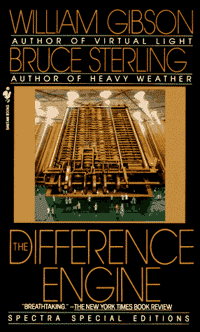I know, right: Why put myself through the torture of a third part when I just about had my faith in humanity crushed in the second? Answer: change of tactics. Let's see if we can't identify some of the nice things positive reviewers are saying that might be worth taking issue with.
(Vendetta against the entire world? What vendetta against the entire world?)
As evidenced by the existence of The Difference Dictionary, there are more than enough references to factual figures to keep the plot from taking too many artistic liberties:
There's something here for everyone as famous scientists, politicians and artists all make appearances - only the most erudite reader could catch them all, but every one you do catch gives a tiny frisson of being in on the joke. It's a brilliant combination of historical research and creative re-imaging pulled off with considerable style. (Source.)This sort of name-dropping does indeed impart a sense of elitism to the reader. I'm just starting Jonathan Lethem's Chronic City, and the main character's new best friend spends most of the first chapter playing up obscure films. It takes place in the Criterion offices, as a matter of fact, and I Am Curious (Yellow) gets mention on the second page. I can't imagine anyone without a fine arts degree or a fair number of friends in the scene would know what that is. I haven't seen it.
I guess there are two sorts of name-dropping. The first is the kind that Gibson and Sterling ostensibly employ, which is not only a requisite for historical accuracy but also probably inspired by their readings of historical documents from the time. I'm not really passionate about history*, but I can understand a writer finding certain people or projects worth incorporating into his work, especially if it happens with a bit of charicature, or a chance to give those people or projects a space in which to slide out from obscurity and finally get some acclaim. The second type of name-dropping is gratuitous, empty of real investigation. I find this mention of I Am Curious (Yellow) by Lethem to have this ring - he needed an obscure film, one likely to be released by Criterion, that could make for an interesting line or two (a chance to mention "bare bodies of hippies cavorting in a mud puddle"). Fair enough, I guess, if you're just trying to fill in a setting - and it never hurts to learn new things. But if anyone ran straight to Youtube for clips of Yellow, they'd be wasting their time as far as the novel goes. It seems a requirement that people keep one eye on Google throughout the reading of The Difference Engine. The famous difficulty of reading it in the early '90s was that these resources weren't handy enough; people with prior knowledge had an inestimable advantage.
When you read fantasy, especially large series, you more often than not get a handy glossary of names and places at the end. The urge to create an entire universe comes with the knowledge that the reader might get lost at times. When you recreate a time, however factual, that not many people would know about by chance (in comparison to, say, any book written about World War II), the same sort of rule should apply. The Difference Dictionary was created precisely to address this failing. I can't say yet whether The Difference Engine's references are always relevant to the book and never gratuitous, or if I'll feel like I wasted my time learning all these new names. The difference may just lay in the power of the authors to convince me that the characters deserve to be read about.
- Allana
*I apologize for the generality of this statement, and want to point out that it means my personal interest in name-dropping is exclusively for cohesion within the book, not necessarily a wider importance to the world at large. If you're the type that's always hungry for new knowledge and won't let a single reference slip by without devouring all relevant material, then all name-dropping is probably quite enjoyable for you.




No comments:
Post a Comment